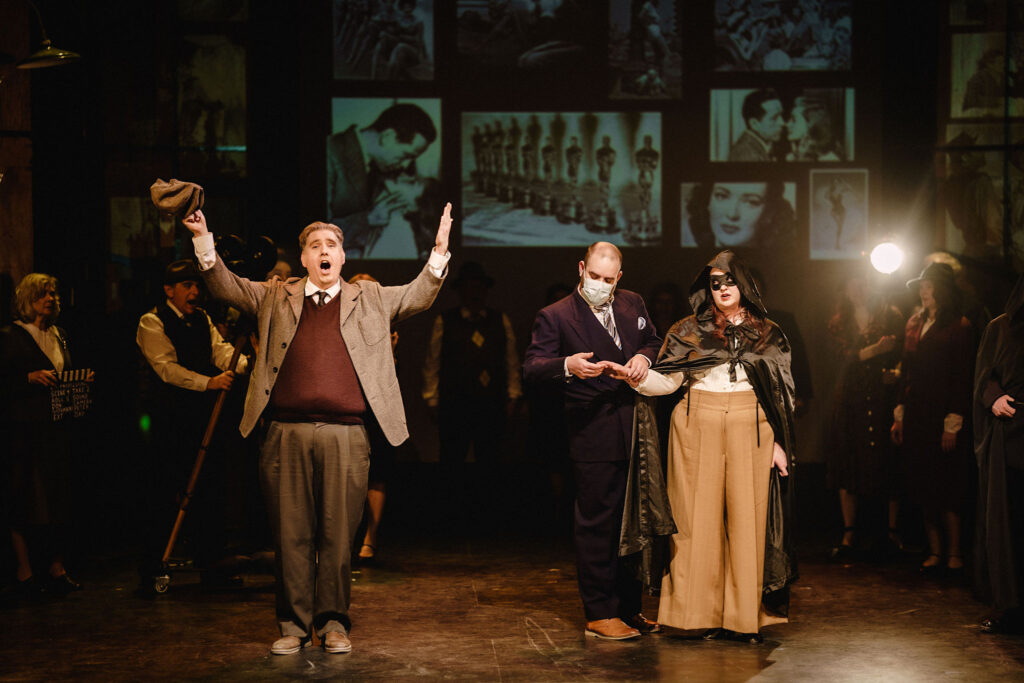Jennifer Tung, music director at Toronto City Opera, has a uniquely informed firsthand perspective on the practiced art of conducting major works invariably characterized by a ticklish blend of remarkably youthful casts and minimalist piano scores.
“When singers sing with a piano, very frequently the pianist just follows the singers wherever they go, including in performance. Clearly that’s not the experience they would get if they were doing this with an orchestra. So Ivan (Ivan Jovanovic, collaborative pianist) and I have a deal that he doesn’t follow the singers, he follows me. We make it very clear in rehearsals that it’s my tempo, for instance. For the structure to work, it has to be at this tempo. They learn to trust me rather than their ear which a lot of times is detrimental to singers when you get on stage with an orchestra because you can’t hear properly most of the time.”
In the case of TCO’s latest undertaking, a brisk, refreshingly forthright mingling of music and text, that trust is quite clearly abundantly well-placed. Partnered by stage director Melissa Morris, Don Giovanni, presented as a darkly atmospheric deep dive into 1940s Hollywood, smoulders with an irresistible mix of glamour and risk.
Premiered in 1787, Don Giovanni has long endured as something of an oddity in the catalogue of popular Western opera, a superbly crafted study in theatrical contradiction. Termed dramma giocoso by eternally sardonic librettist Lorenzo Da Ponte, playfully labelled opera buffa by his infinitely more benevolent collaborator, composer Wolfgang Amadeus Mozart, the dangerously dissolute tale of debauchery and damnation wrapped in music of towering grace has been in essentially continuous worldwide rotation from the moment Mozart personally signalled the first downbeat on the podium in Prague.
Narratively blunt, flashed with outbursts of extreme violence, the philandering aristocratic — reimagined by director Morris as a successful, morally vacuous film producer — represents something of an abiding enigma. For all of Don Giovanni’s celebrated prowess as an epic seducer — his long-suffering servant Leporello, updated to chauffeur here, keeps meticulous track of his conquests — Da Ponte/Mozart’s devious centre of disrepute proves remarkably inept at securing new triumphs on stage. Onset impotence some opera analysts have suggested. Or self-loathing. Or ennui.
Much to her credit, Morris bravely chooses to forgo the debate, opting instead to maintain steady focus on tangible pre-existing story rather than abstract subtext. Vague notions of psychology are bundled into the shadows where they remain fundamentally unscrutinized. City Opera’s Don Giovanni is as as big and bold as he is cowardly and opportunistic. A slippery player, the self-declared star of the tawdry B-movie that is his life, claws and clambers his way to top billing on a flashy self-erected marquee, cine camera rolling.
The language of Hollywood noir insinuates itself into virtually every moment of Morris’ gritty, filmic mise en scène, the director’s slangy tough-guy talk fundamentally reshaping a good deal of dialogue in the form of whipsmart, picture palace-inspired quips.
“Don’t snap your cap, pal!”
Originated by Morris with obvious unapologetic delight, the flow of gangster-speak conveyed in the form of crisp surtitles markedly contributes to the task of striking a continuous, emphatically paradoxical note. Laughter here is plentiful, violence, quick, brutal and blunt. Fist fights and practical jokes are the order of the day.
A flood of startling black and white images, courtesy projection designer Vojin Vasovic, hugely amplifies the overarching atmosphere. Time and place are graphically sketched — a period traffic-filled boulevard lined with iconic palms, Grauman’s Theatre, Paramount Pictures, the Hollywood Hills — lighting designer Chris Humphrey’s razor-sharp spots slicing through a rising shroud of unsettling stage fog. Don Giovanni’s traditionally prescribed descent into hell, courageously undertaken by Morris and company at TCO’s current venue at the Al Green Theatre, comes amid a positively volcanic eruption of special effects.
Appearing in the title role, baritone Michael Robert-Broder instantly commands attention, singing with great strength and rolling, resonant tone, swiftly pivoting from the dynamic to sotto voce with supreme unruffled confidence. His rendering of Mozart’s penultimate amorous serenade, Deh, vieni alla finestra, o mio tesoro, rebranded per the production’s typically irreverent surtitles as “Come to me, dollface, bring yourself closer to me”, is particularly fine, shimmering with seduction.
Fellow baritone John Holland as Leporello provides something of a masterclass in tireless physical comedy, devouring entire swaths of scenery with wreckless abandon. Don Giovanni’s famed catalogue aria, Madamina, il catalogo è questo, is breezily dispatched with ideal timing and proportion.
Soprano Paulina Swierczek sings Elvira, a no-nonsense actress of a certain age. An exceptional voice, cloudless and soaring at the top with a rich mellow creaminess to her lower register, Swierczek greatly impresses from lights up to blackout, never more affecting or passionate than in her character’s furious aside, In quali eccessi, o numi (“God, he makes me so unhappy”) seguing to the torment of Mi tradi quell’alma ingrata (“He deceived me without pity”), all delivered with showstopping emotion, raging, tremulous, spotlit centre stage.
Soprano Lauren Estey and tenor Alexander Cappellazzo are an admirably well-matched Anna and Ottavio, vocally centred, dramatically simpatico, second hand witness to murder and cop.
Soprano Thera Barclay and baritone Austin Larusson are a starry-eyed Zerlina and loveable lunkhead Masetto, actress and stuntman. Masterful singer-actors both.
Bass Gabriel Sanchez-Ortega is The Commissioner, splendidly luminous and thunderous as Don Giovanni’s haunting agent of ghostly retribution.
The Toronto City Opera Chorus is consistently excellent, men and women both, making several stirring, high-spirited appearances throughout the course of the evening.
Ivan Jovanovic partners, summoning more than a smattering of vibrant orchestral colour lurking beneath the lid of his concert grand, continuo, played on simulated electric harpsichord, an endless source of unexpected delight.
Moody, animated, sparklingly well sung this highly inventive, far from modest Don Giovanni delivers major thrills.


